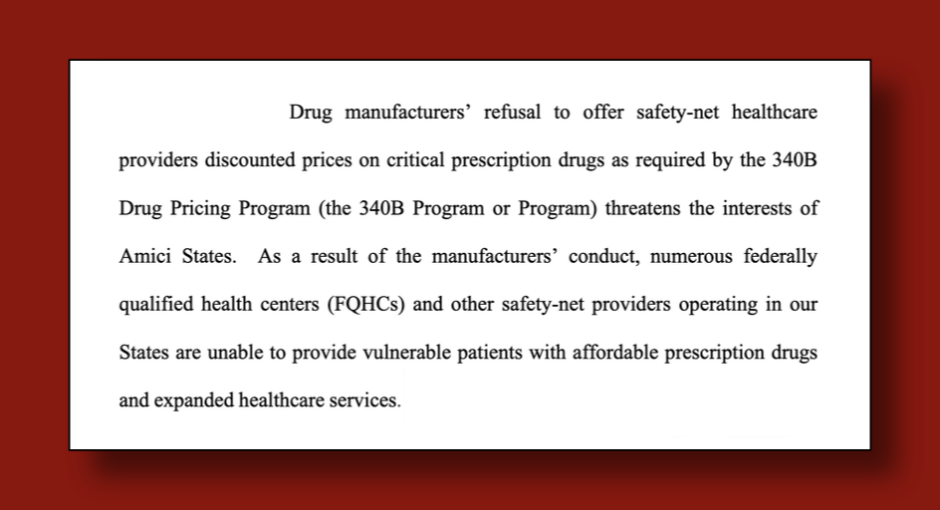Yesterday, 340B Report broke the news that a group of 25 states from blue bastions such as Connecticut and Maryland to red states such as Arkansas and Mississippi weighed in favor of the federal government’s effort to punish drug manufacturer for restricting the use of the 340B program in the contract pharmacy setting. Today, we take a deeper dive into the arguments that 25 state attorneys general made in federal court filings yesterday.
Drug manufacturers’ conditions on 340B pricing when covered entities use contract pharmacies violate federal law and ultimately diminish states’ public health efforts, 25 states told two federal appeals courts yesterday.
Manufacturers “have long understood the requirements for participating in the 340B
program and the remedies long afforded to them to address any diversion or duplicate claims—they cannot now unilaterally modify a federal statute,” a bipartisan group of state attorneys general said in May 16 friend of the court briefs filed in 340B contract pharmacy lawsuit before the U.S. Court of Appeals for the District of Columbia and the U.S. Third Circuit Court of Appeals in Philadelphia.
The manufacturers have “no basis for their reading of the statute,” the state AGs said.
The states’ bipartisan support for the U.S. Health and Human Services Department (HHS) and the Health Resources and Services Administration (HRSA) in the cases is not by itself decisive. It adds heft however to HHS and HRSA’s determinations that the companies are breaking the law and must stop, or they could face massive civil monetary penalties.
Companies “Flouted” the Law
For nearly two years, drug manufacturers “have flouted their statutory obligation to offer safety-net providers 340B-discounted prices on critical prescription drugs,” the states said in their amicus briefs.
The states took aim at the manufacturers’ arguments that their restrictions are proper because the word “pharmacy” is not in the 340B statute and because their policies are necessary to prevent drug diversion and duplicate discounts.
The states said that “while it is true that § 340B is silent as to the use of contract pharmacies … the statute’s ‘silence’ is certainly not a prohibition.”
“Congress did not need to expressly authorize the use of contract pharmacies [in 340B] because it legislated with the understanding that the contract pharmacy networks were already in place and operating to facilitate prescription-dispensing services to patients,” the states said. “In 1996, four years after the statute’s inception, only 4% of covered entities maintained in-house pharmacies.” The states told the two appeals courts they “should not assume that Congress intentionally structured the program so that only 4% of covered entities would be able to fully participate.”
“Improper Way to Remedy any Disputes”
“Contract pharmacy arrangements as a dispensing mechanism are consistent with § 340B, and manufacturers’ new policies are an improper way to remedy any disputes regarding duplicate reimbursements or drug diversion,” the states said.
Covered entities must submit contract pharmacy agreements to HRSA and dispensing is available only after an agreement is finalized and approved by the agency, the states pointed out. Third party administrators put claims through several filters before they are deemed eligible for 340B pricing, entities maintain title to the drugs, and entities must keep auditable records and inventories, the states continued.
Congress, the states added, created the 340B program administrative dispute resolution (ADR) process “as the appropriate forum in which manufacturers and covered entities can resolve disputes.”
“There is no basis for now disputing the use of contract pharmacies without at least engaging in the ADR process as intended by Congress,” the states said.
The states also challenged manufacturers’ argument that 340B sales of the companies’ drugs “somehow enrich for-profit commercial pharmacies.”
“This is a critical point,” the states said. “Any profits, or revenue, from the sale of manufacturers’ drugs cannot in practice enrich contract pharmacies because revenue can only be generated by the spread between the ceiling price and any reimbursement at or above that price from third-party payers. … The benefit of this difference between the ceiling price and the eventual reimbursement is claimed only by covered entities.”
Revenue generated from the use of contract pharmacies, the states said, lets covered entities “make healthcare affordable and accessible to more patients” in compliance with statutory commitments. Entities use of those revenues also supports states’ public health efforts.
“The new conditions unilaterally imposed by drug manufacturers reverse those gains and upset the role of the states in the administration of the 340B program,” the attorneys general said.
December 2020 Letter to Azar
In December 2020, 29 state attorneys general sent a letter to then U.S. Health and Human Services (HHS) Secretary Alex Azar urging his department “to address drug manufacturers’ unlawful refusal to provide critical drug discounts to covered entities” on drugs dispensed by contract pharmacies.
Connecticut Attorney General William Tong co-led that past effort and led the new push for the federal appellate amicus briefs. One of his co-leaders two years ago was then California Attorney General Xavier Becerra, who went on to succeed Azar as HHS secretary.
Twenty-two of the 29 states that signed the December 2020 letter to Azar also signed yesterday’s appellate briefs: Connecticut, Colorado, Delaware, District of Columbia, Hawaii, Illinois, Iowa, Kansas, Maine, Maryland, Massachusetts, Michigan, Minnesota, Nebraska, Nevada, New Jersey, New Mexico, North Carolina, Oregon, Pennsylvania, Rhode Island, and Vermont.
California, New York, Oklahoma, South Dakota, Virginia, Washington, and Wisconsin signed the letter to Azar two years ago but did not join the appellate briefs.
Four states absent from the letter to Azar signed the briefs: Arkansas, Louisiana, Mississippi, and Utah.


